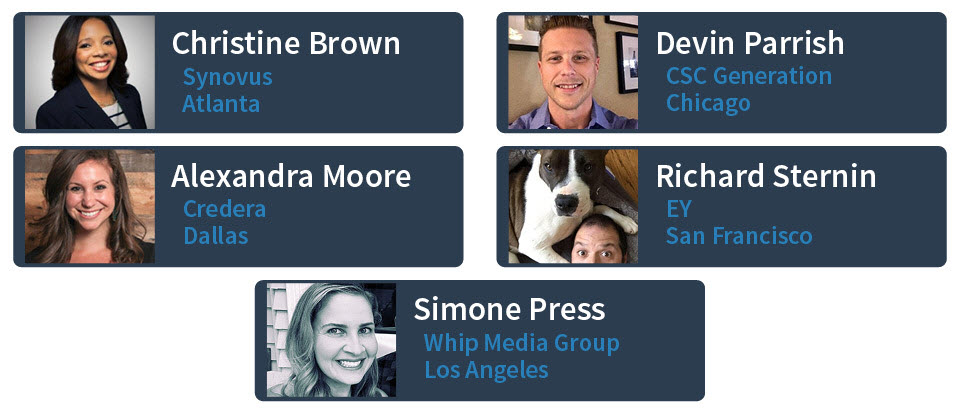What do you look for in a recruiter when you are building out your team?
Not all recruiters are created equal and each company seems to have their own culture that needs the proper “handling.” If you are a Talent Acquisition leader, what do you look for when hiring for your team? Read on to learn from our panelists what companies look for in their recruiters.
Devin Parish, CSC Generation, loves to use scenario-based questions, drawn from the real world, to get a sense of a candidate’s organization and stakeholder management skills. These are especially critical in large organizations where a recruiter may be handling 20 to 40 reqs at a time while partnering with the hiring team and managing their expectations.
Our panelists:

Organization skills
- How do you organize your day or week?
- What does your calendar include? (He looks for what works for him: color coding and time blocking.)
Stakeholder management
- What do you say when the CEO, who is active in TA and recruiting, calls to ask why a position is not filled after a week working on it?
- If you have three jobs of equal importance, how do you prioritize your time and activities?
- What’s the most creative solution you’ve come up with to solve a problem?
Role play or scenario-based questions: Panelists share their perspective on each approach, from catching candidates off-guard to having them develop a 30-day campaign to fill a req.
Psychometric tests: Some organizations don’t do psych tests if it runs the risk of screening out for neurodiversity, while others use them for onboarding only.
Alexandra Moore of Credera says each organization requires different hard and soft skills for a recruiter to be successful in that culture. She recommends structured interviews to assess how well a candidate matches the profile. And, her team pays careful attention when a new recruiter doesn’t work out and adjusts the profile to ensure a better match the next time.
Critical thinkers, not order takers: Recruiters should be problem-solvers, which means not only examining reqs critically but also challenging the hiring manager, if necessary, and finding ways to improve the speed of hiring or why a search isn’t delivering the right candidates.
Checklist for Recruiters Seeking Jobs
If you are a recruiter looking for a new job, the panelists suggested:
- Ask questions to understand the nuances of the company’s culture of recruiting so that you can speak to your situational answers.
- If you don’t have specific experiences to share, explain how you would approach it and show that you have a growth mindset to evolve your skills to fit the recruiter profile the company needs.
- If you don’t have specific recruiting experience, emphasize transferable skills such as marketing savvy, curiosity, and customer service.
- If you are looking to switch industries, seek out firms that echo your previous employers — e.g., if you were in higher ad admissions, look for recruiting jobs in an educational technology company.
- Make sure you’ve built up your book of contacts on LinkedIn, since a low number can be a red flag for employers hiring recruiters.
Simone Press, Whip Media Group, believes that hiring recruiters with a strategic view on diversity and inclusion (D&I) can bring strength to the recruiting department as well as the entire organization.
Think outside the box. Go beyond the people you know. Interview people you might not want to interview.
Use assessment-based interviewing questions: Give them a “fake search” list and find out how they problem solve and communicate efficiently with clients. Learn how they will handle a hiring manager who doesn’t want to follow the process.
Eliminate your biases to expand diversity: First, know your own biases and then stop yourself from reacting to candidates based on them. Think “outside the box” by looking at candidates in other fields with transferable skills.
Seeking “soft” skills? Quantify them. For example, if likeability is a thing for your culture, build a consistent, numeric scoring system, to allow for a quantitative assessment of candidates.
Assemble a diverse and collaborative interview team: Don’t just include potential recruiting department or HR colleagues. Include people from the business side such as sales as well as positions like the COO.
Look in your own backyard: Scout for candidates in the ranks of your recruiting coordinators (RCs). They can be passionate, organized, ambitious, willing to learn and grow, already understand the business and know how to be a partner with what a recruiter needs.
How to free up time to hire recruiters
With Harver Reference, you can gather references in just 2 minutes of recruiter time. All that saved time and effort can be invested in more strategic tasks, like finding the best recruiters available. Schedule a demo to learn more the efficiency and value of automates reference checking with Harver.

